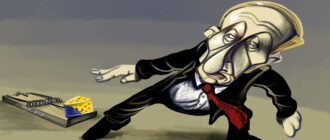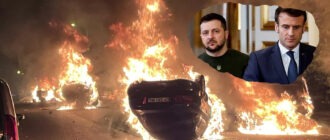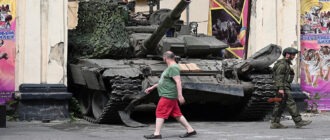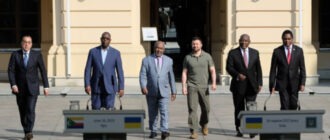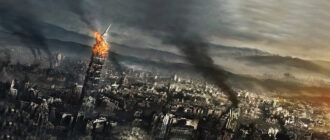Reflecting on the previous analytics and thinking of why Vladimir Putin did not come to the CSTO summit in Dushanbe, he’s, like, self-isolated. Either Sputnik V proved to be a crock of shit like Novichok or he just got scared – you never know what may happen there in Dushanbe. Or, he probably didn’t want to provide his partners with personal covenant. The situation for the Russian Federation appeared to be much too of a stalemate. For whatever cause, Russian President avoided the trip to Tadzhikistan for a good reason.
Obviously, the main topic of the meeting should have been the situation in Afghanistan, where the “shameful getaway”, as stated not a long time ago, of the United Sates is more akin to a multi-move combination by Biden to put Moscow, as of yesterday having been the key player in the Central Asian region, in the most uncomfortable positions in facing the choice between the bad and very bad, since the order to which Kremlin was used, and which ensured domination of Moscow had collapsed in a flash. Russia found itself left with the Central Asian peoples exporting the interstate conflicts and tensions to the Russian cities, primarily, to Moscow and Saint Petersburg.
Take Uzbekistan, for example. During the rule of Islam Karimov, the former party boss, Uzbekistan has been a classic secular state. Combating the radical Islamism targeted even those, whose beards appeared too long, while the methods of this struggle were such, so that representatives of local organizations, such as Hizb ut-Tahrir, were complaining, that during interrogations their members were doused in the boiling water.
In the meantime, after death of the founder of independent Uzbekistan, and coming to power of Shavkat Mirzioev, the religion, as peculiar to the post-soviet states, started to gain a status of important conservative institution aimed at justifying unprecedented social inequality and resulting in absence of civil rights of the overwhelming majority. And when Taliban took power in Afghanistan, Tashkent was not only dealing with foreign policy issues, like protecting the Uzbek minority and preventing refugees from flooding the country, but also the domestic issues – to again demonstrate, that the total secularism era passed into oblivion. To show, that Uzbekistan is ready to not only provide Afghanistan with humanitarian aid, but even recognize its new government consisting of former militants and international terrorists.
And the worst thing is that this concession is just the beginning, since, in fact, the Tashkent regime has no other ways of justifying flagrant social injustice. And, as beginning to cave in to Taliban in the diplomacy area, Uzbekistan with its clandestine services at the helm would simply assimilate with Taliban with further planning of reformatting into the Taliban-light version. And for Moscow, as you may figure out, this threat is pretty tangible, as the radical Islam trending in Uzbekistan would be bound to have an effect on the Uzbeks residing in Russia. Uzbekistan has been exporting the radicals to Russia before, but now it threatens to become a base for the Islamic activities.
At the same time, Tashkent’s overtures with Taliban triggers a growing backlash from Dushanbe, where in a well-argued manner the statements are made on the genocide of Tadzhiks in Afghanistan, as well as on the direct involvement of Islamabad. They say it was not Taliban, who assaulted the rebellious Panjshir province, but they used the Pakistani instructors, UAV’s, and even manpower. Moreover, the Pashtuns from the Pakistan’s Waziristan are now accommodated in the houses from which the Tadzhiks were banished. Obviously, Dushanbe will, in every possible way, persuade Russia to provide if not military, but at least diplomatic support. The only thing is that Tashkent will firmly stand up against it, down to the threat of outright exit from all the treaties arranged by Moscow.
The Tadzhikistan-Uzbekistan conflict, effectively a geo-political one, would have been impossible before. Now, the ideological interests will be pushing Moscow to support Dushanbe, while Tashkent is within Moscow’s geopolitical interests. Tadzhikistan, in actual fact, has no army, while Uzbekistan is the strongest player in the region. Moreover, the Tadzhik nationalism itself is an explosive phenomenon, since there is one step from protecting the Panjshir Tadzhiks from genocide to the talks on returning the Tadzhik’s city of Bukhara back to the Great Tojikiston. Emomali Rahmon, the President of Tadzhikistan, is getting ready to hand over power to his son, Rustam Emomali, and a war, as a way to unite people behind the family, comes in handy.
However, the dispute over Bukhara is purely hypothetical as yet, but the recurring conflicts, involving shoot-outs, at the Tadzhikistan-Kirgizia border is an objective reality. Literally yesterday the three ethnic Tadzhiks were sentenced to life for taking part in the border conflict. And this is also a mobilizing factor for the Tadzhik society. And it will be further unwinding. And to deal with it will take the framework of the aforementioned CSTO. And Putin, had he been to the meeting, would have participated in this showdown. Russia already has to take part in these showdowns right in Moscow – by setting apart the melees of Central Asian immigrant laborers occurring over the interethnic hostility, which remains inconceivable for the minds of local police. But Russia is one thing – the instigators will simply be deported, while CSTO is another story, and axing somebody from the organization is harmful for Russia itself.
Aside from the above mentioned, in Uzbekistan there will be the presidential elections already next weekend, while in Kirgizstan the legal proceedings on investigating preparations for a coup have been commenced. The power, that only half a year ago had come to rule through the coup, already started to combat the plots against themselves, which definitely is disquieting, or, if you will, reassuring in the negative sense. Moreover, against the backdrop of the extremely stressful elections in Russia, when the threat of civil unrest has already been declared as the main danger to the country, with all the chain of epic fails that had been following preparations for the elections – from the IL -112 plane crash and mass melees of immigrant laborers to the recent assault on the police station with the use of a shaped charge in Voronezh region, and the strange death of the Head of the Federal Rescue Service, the former bodyguard of Putin.
The death of own bodyguard, though former, and on the eve of the elections – is already enough reason to self-isolate, and, preferably, in the shelter. Let alone going to the territory, where the rallies to require a war is an everyday practice. The only thing in it all that fully reverses the much-hyped Putin’s good sense is that the Russian Federation is a key player in the region. A lot depends on its official stand. And if, in the extremely complicated situation as we see today, Moscow would alienate itself from the leadership and rely on a bit of luck, its role of a mediator might be taken over by somebody else: Beijing, Ankara, Islamabad, Delhi, or that Washington, for God’s sake, a withdrawer from Afghanistan, but still retaining its presence in the region. And what the Kremlin is left with when the Americans come to its former zone of strategic interests, we, in Kiev, know perfectly well and firsthand.


